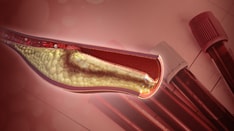TOPLINE:
At 5 years, clopidogrel was noninferior to aspirin for net adverse clinical events in patients who have undergone percutaneous coronary intervention (PCI) using drug-eluting stents but was superior to aspirin in reducing secondary endpoints of myocardial infarction (MI) and ischemic stroke, a new analysis showed.
METHODOLOGY:
- One-year results from the randomized, multicenter Short and Optimal Duration of Dual Antiplatelet Therapy 2 (STOPDAPT-2) trial showed clopidogrel monotherapy after a month of dual antiplatelet therapy (DAPT) substantially reduced major bleeding compared with continued DAPT using clopidogrel and aspirin, without an increase in cardiovascular events, among Japanese patients undergoing PCI.
- According to the trial protocol, clopidogrel monotherapy was continued in the 1-month DAPT group (clopidogrel group), while the 12-month DAPT group was shifted to aspirin monotherapy (aspirin group). The authors reported 5-year results in 3005 patients — mean age 68.6 years, 22.3% women, and 38.3% with acute coronary syndrome at baseline.
- The primary endpoint was net adverse clinical events, defined as a composite of cardiovascular outcomes (death from cardiovascular causes, MI, stent thrombosis, stroke) and major or minor bleeding.
- Secondary outcomes included the separate cardiovascular and bleeding components of the primary endpoint and newly diagnosed cancer because there's some suggestion aspirin might protect against colorectal cancer.
TAKEAWAY:
- The clopidogrel group was noninferior, but not superior, to the aspirin group for the primary endpoint (11.75% vs 13.57%; hazard ratio [HR], 0.85; 95% CI, 0.70-1.05; P for noninferiority < .001; P for superiority = .13).
- The clopidogrel group was superior to the aspirin group for the major secondary cardiovascular endpoint (8.61% vs 11.05%; HR, 0.77; 95% CI, 0.61-0.97; P for noninferiority < .001; P for superiority = .03), mainly driven by reduction in MI and ischemic stroke.
- The cumulative 5-year incidence of major secondary bleeding was not lower in the clopidogrel group (4.44% vs 4.92%; HR, 0.89; 95% CI, 0.64-1.25; P = .51), possibly due to the high prevalence of proton pump inhibitor use (79%), said the authors, nor was the incidence of newly diagnosed cancer.
IN PRACTICE:
"Clopidogrel might be an attractive alternative to aspirin with a borderline ischemic benefit beyond 1 year after PCI," the authors wrote.
"This important study confirms that ischemic protection post-PCI is better ensured by clopidogrel than aspirin from 1 month to 5 years," wrote Anne Bellemain-Appaix, MD, Cardiology Department, Antibes Hospital, Antibes, and Sorbonne University, Paris, France, and a colleague in an accompanying editorial, adding that beyond 1 month, DAPT de-escalation to a P2Y12 inhibitor alone "may become the new standard of care among select, if not most, patients."
SOURCE:
The study was carried out by Hirotoshi Watanabe, MD, Department of Cardiology, Hirakata Kohsai Hospital, Hirakata, Japan, and colleagues. It was published online on January 2, 2023, in the Journal of the American College of Cardiology.
LIMITATIONS:
Although overall adherence to antiplatelet therapy was more than 80% during follow-up, participants with clinical events such as revascularization often changed antiplatelet therapy, so they may not have been treated as allocated. The study enrolled only Japanese patients, and there might be risk differences in cardiovascular and bleeding events across ethnicities. Researchers didn't have data on the status of medications other than antithrombotic therapy. The study didn't include a formal cost-effectiveness analysis, which would be crucial for adopting a lifelong treatment (aspirin is relatively inexpensive).
DISCLOSURES:
Bellemain-Appaix has received lecture fees from Novartis, Biotronik, AstraZeneca, and BMS/Pfizer; see editorial for additional disclosures.



Comments